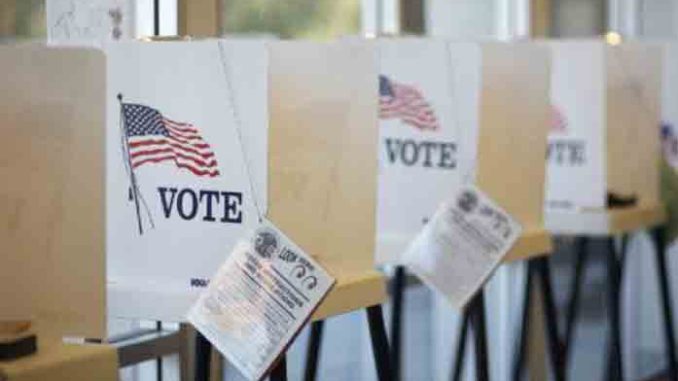
While more than half of all votes cast in Arizona for the 2020 General Election will have been mailed in or returned via drop boxes, a few million voters are still expected to show up in-person at voting centers and polling places on Nov. 3.
And that has election officials trying to get their “do and don’t” messages out to voters in hope of avoiding any problems that could lead to an unintended arrest.
Lisa Marra, Cochise County Director of Elections, issued a statement Sunday reminding voters and others about who can be inside the 75-foot perimeter around each voting location in Arizona and what can be done within that area.
“The only people allowed inside of that 75-foot limit are voters who may be accompanied by their children and/or someone to assist the voter, Election Officials to include Pollworkers, credentialed political party observers, and authorized U.S. Department of Justice observers,” Marra noted, adding that cell phone use is not allowed inside a Vote Center except to show certain forms of identification.
She also stated it is a violation of state law to conduct electioneering activities within the 75-foot perimeter. Such unlawful activities include handing out campaign literature, talking to voters or poll workers about candidates or issues, or otherwise attempting to influence the election.
Marra also addressed the fact that private citizens, even if properly licensed, cannot enter the 75-foot perimeter with a weapon. And because many voting centers are set up at schools, it is possible a weapons misconduct charge could be filed if someone brings a firearm on school property, even if the person is outside the 75-foot perimeter.
Further, the use of cameras or video recorders within the 75-foot limit “is prohibited and punishable as a misdemeanor,” Marra reminded voters, adding that cell phone use is not allowed inside a Voting Center except to show identification.
Elections officials are also drawing attention to activities outside the 75-foot perimeter that pose potential problems and could result in prosecution for unlawful voter intimidation.
Marra noted that the open carry of a firearm outside the 75-foot limit is problematic, and that “any aggressive or ostentatious display of a weapon will almost certainly constitute an act of intimidation. In addition, taking photos or videos outside the 75-foot limit “may have an intimidating effect on voters entering or exiting the voting location if done in an aggressive, threatening, or harassing way,” she said.
Which leads to the quagmire of one person’s exercise of a First Amendment right of expression being seen by someone else as an act of voter intimidation. And whether the presence of law enforcement officers is a sign of security or a threat.
Last month the Washington D.C.-based Voter Protection Corps Foundation sent a letter to Pima County Administrator Chuck Huckelberry expressing concern about the presence of officers at polling stations on Nov. 3.
“We wish to focus on eliminating voter intimidation arising from the presence of law enforcement and private security at polling places on Election Day,” the Oct. 24 letter stated.
The letter asked Huckelberry to confirm in writing that officers and security personnel would only be at a polling place in response to a specific threat made by “private individuals or groups armed with semi-automatic or other weapons” against the safety of voters or poll workers.
The issue of ensuring voter and worker safety arose in Pima County during the Oct. 7 to Oct. 30 early voting period. County Recorder F. Ann Rodriguez contracted off-duty sheriff’s deputies and local police officers to provide security at early voting sites within their respective jurisdictions.
There were no reported incidents as of Oct. 27, according Huckelberry. However, Tucson Mayor Regina Romero ordered Tucson officers to stop working the security details days before early voting ended due to concerns that the mere presence of a peace officer intimidated voters.
